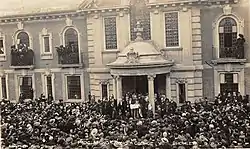Bromley Town Hall
Bromley Town Hall is a municipal building in Tweedy Road, Bromley, London. Built in 1906, it is a Grade II listed building.[1][2]
| Bromley Town Hall | |
|---|---|
 The proclamation of the ascendancy of George V to the throne being read out at Bromley Town Hall on 9 May 1910 | |
| Location | Bromley |
| Coordinates | 51.4064°N 0.0179°E |
| Built | 1907 |
| Architect | R. Frank Atkinson |
| Architectural style(s) | Baroque style |
Listed Building – Grade II | |
| Official name | Town Hall, Bromley |
| Designated | 29 June 1973 |
| Reference no. | 1299012 |
Listed Building – Grade II | |
| Official name | Town Hall Extension, Bromley |
| Designated | 8 December 1993 |
| Reference no. | 1261448 |
 Shown in Bromley | |
History
The building was commissioned to replace an old 19th-century town hall in the Market Square.[3] The site selected for the new building was bounded by three existing residential streets.[4]
The foundation stone for the new building was laid by a former charter mayor, Thomas Dewey, on 25 July 1906.[5] The new building was designed by R. Frank Atkinson in the Baroque style and built by F. G. Minter of Putney.[6] It was officially opened by the mayor, Alderman Reginald James, on 25 September 1907.[7] The design involved a symmetrical main frontage with 15 bays facing onto Tweedy Road; the central section of three bays featured a semi-circular porch supported by four Ionic order columns and surmounted by an urn on the ground floor; there were three windows with a pediment above on the first floor; a wooden cupola with a copper dome was erected at roof level.[1] The principal rooms were the council chamber and the mayor's parlour, both located on the first floor.[4]
An extension designed by Charles Cowles-Voysey in the Neo-Georgian style was completed in 1939.[2] The design involved a frontage of 17 bays facing onto Widmore Road; the central section featured a doorway with stone surround on the ground floor; there was a window with stone surround on the first floor.[2] The principal room was a new council chamber located on a mezzanine level at the rear of the building.[4]
The building was established as the headquarters of the Municipal Borough of Bromley and continued to function as the local of seat of government when the enlarged London Borough of Bromley was formed in 1965.[8] David Bowie's wedding to Mary Angela Barnett took place in the town hall in March 1970.[9] An underground nuclear fall-out shelter was built under the extension during the 1980s.[9]
As part of a larger regeneration scheme to create a new Civic Centre, the council moved their offices to the old palace in 1982.[10][11] The town hall was then used as the home of the Bromley College Business School until 2007.[12][13] The building, which subsequently became vacant, was added to the Heritage at Risk Register in 2009.[14] In 2020 works began to convert the town hall into apartments and new offices and to establish a boutique hotel on the site.[9]
References
- Historic England. "Town Hall, Bromley (1299012)". National Heritage List for England. Retrieved 28 April 2020.
- Historic England. "Bromley Town Hall, extension (1261448)". National Heritage List for England. Retrieved 28 April 2020.
- "Market Square, Bromley". Ideal Homes. Retrieved 28 April 2020.
- "London's Town Halls". Historic England. p. 25. Retrieved 25 April 2020.
- Greenhalgh, Matthew. "Gentlemen Landowners and the Middle Classes of Bromley: the transfer of power and wealth? 1840-1914" (PDF). p. 212. Retrieved 28 April 2020.
- Foundation stone on Tweedy Road
- "Bromley Town Hall". London Borough of Bromley. Retrieved 28 April 2020.
- "Local Government Act 1963". Legislation.gov.uk. Retrieved 25 April 2020.
- "Bromley Town Hall". MNP. Retrieved 28 April 2020.
- "A Bromley walk". London Footprints. Retrieved 26 April 2020.
- "Bromley timeline 1860 – 2000". London Borough of Bromley. Retrieved 28 April 2020.
- "Bromley mum says redevelopment of Old Town Hall will 'ruin' character of the area". News Shopper. 15 October 2019. Retrieved 28 April 2020.
- Skills and Training Directory. Institute of Leadership & Management (Great Britain). 2003. p. 99. ISBN 0-7494-4052-X.
- "At-risk buildings, monuments and parks revealed by English Heritage". News Shopper. 24 June 2009. Retrieved 28 April 2020.